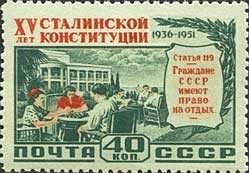Stamp: Right to rest (Article 119 of Constitution of the USSR) (Soviet Union, USSR 1952)
Right to rest (Article 119 of Constitution of the USSR) (Soviet Union, USSR 1952)
15 May (Soviet Union, USSR ) within release Politics goes into circulation Stamp Right to rest (Article 119 of Constitution of the USSR) face value 40 Russian kopek
| Stamp Right to rest (Article 119 of Constitution of the USSR) in catalogues | |
|---|---|
| Michel: | Mi:SU 1629 |
Stamp is square format.
Also in the issue Politics:
- Stamp - Right to education (Article 121 of Constitution of the USSR) face value 40;
- Stamp - Right to work (Article 118 of Constitution of the USSR) face value 40;
- Stamp - Right to rest (Article 119 of Constitution of the USSR) face value 40;
Stamp Right to rest (Article 119 of Constitution of the USSR) it reflects the thematic directions:
Politics (from Ancient Greek πολιτικά (politiká) 'affairs of the cities') is the set of activities that are associated with making decisions in groups, or other forms of power relations among individuals, such as the distribution of status or resources. The branch of social science that studies politics and government is referred to as political science
A building or edifice is a structure with a roof and walls standing more or less permanently in one place, such as a house or factory. Buildings come in a variety of sizes, shapes and functions, and have been adapted throughout history for a wide number of factors, from building materials available, to weather conditions, to land prices, ground conditions, specific uses and aesthetic reasons. Buildings serve several needs of society – primarily as shelter from weather, security, living space, privacy, to store belongings, and to comfortably live and work. A building as a shelter represents a physical division of the human habitat (a place of comfort and safety) and the outside (a place that at times may be harsh and harmful).
A people is a plurality of persons considered as a whole, as is the case with an ethnic group or nation. Collectively, for example, the contemporary Frisians and Danes are two related Germanic peoples, while various Middle Eastern ethnic groups are often linguistically categorized as Semitic peoples.
An anniversary is the date on which an event took place or an institution was founded in a previous year, and may also refer to the commemoration or celebration of that event. For example, the first event is the initial occurrence or, if planned, the inaugural of the event. One year later would be the first anniversary of that event. The word was first used for Catholic feasts to commemorate saints. Most countries celebrate national anniversaries, typically called national days. These could be the date of independence of the nation or the adoption of a new constitution or form of government. The important dates in a sitting monarch's reign may also be commemorated, an event often referred to as a "Jubilee".



